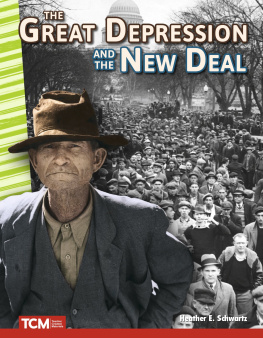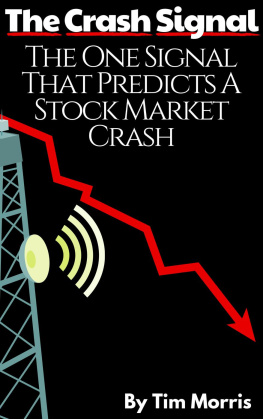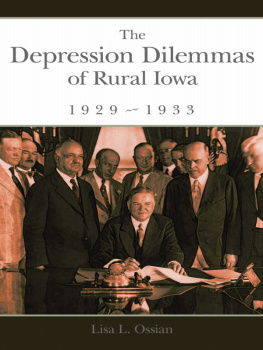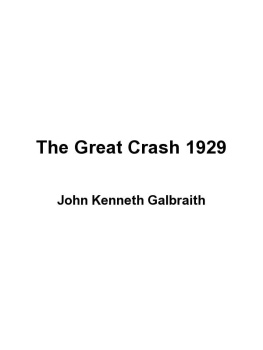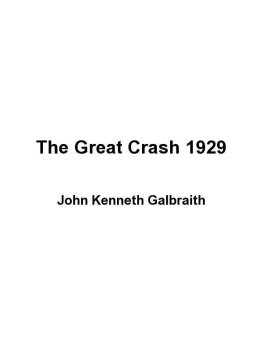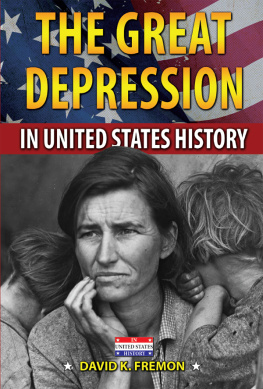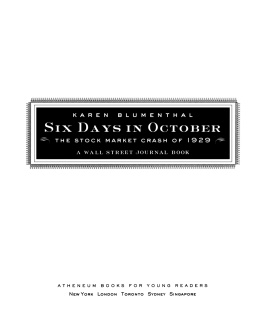Table of Contents
The Great Crash
SELWYN PARKER
Hachette Digital
www.littlebrown.co.uk
To the great narrative historians who can tell the story
Acknowledgements
My sincere thanks to my publisher Alan Brooke, who was kind enough to risk giving me the project and then left me to it, and to my agent Andrew Lownie, who is a great enthusiast and judge of narrative history.
Prologue
Jack Pierpont Morgan and his wife Jessie followed the same routine whenever they came to Britain. They crossed the Atlantic aboard the elegant British-built Mauretania, or the newer Aquitania with its four racy-looking, angled smokestacks, or the Corsair, Morgans private ocean-going vessel. After berthing at Southampton, they were chauffeured to their stately home in the tiny village of Aldenham in leafy Hertfordshire where they generally settled in for a long stay.
Wall Hall was a grandiose home befitting the worlds best-known banker, and probably its richest man. Dating from the early 1800s, it was a late-model castle built in the Gothic revival style complete with a castellated faade and other medieval cues. Appropriately enough, the original occupant of Wall Hall was another prosperous banker, one George Woodford Thelluson, who achieved immortality as a character in Charles Dickens novel of the French revolution A Tale of Two Cities. Tellson, as Dickens chose to call him, owned a bank in Temple Bar that functioned as a kind of high exchange to which aristocrats, mainly refugees from the revolution, entrusted their wealth.
In 1929, Jack, as his friends knew him, or J. P. Morgan Jr as the papers usually described him, could hardly wait to get away from New York and take up residence in Hertfordshire. Having lived in London for several years before returning to New York to take over the parent bank from his father, the fabled Junius Pierpont, he had bought Wall Hall in 1908 after he and his wife fell in love with it. For Boston-educated Jessie, herself the daughter of a banker, the English countryside provided a respite from the teeming streets of the big city; for her husband, it served to lighten the load of the onerous responsibilities that had fallen by inheritance on his shoulders. And at Wall Hall he could become an English gentleman, albeit with an American accent. The residences panelled dining room regularly hosted the upper strata of English society: members of the royal family including Elizabeth, the future Queen Mother, representatives of the aristocracy, leading Churchmen, politicians and bankers. They formed a circle natural to a man who possessed seemingly unlimited wealth and enviable influence in the highest levels of government around the world.
Proud of Wall Hall and its immediate environs, Jack Morgan lavished considerable expense on the estate, and on the village that sat practically on its doorstep. Indeed he was very much the lord of Aldenham, his wife the lady. Jessie threw herself into activities at the local Womens Institute, which met regularly in an old brick building barely five minutes walk from the castle. The couple sometimes worshipped in the seven-hundred-year-old Church of St John the Baptist, and occasionally joined locals for a beer at the Three Compasses pub nearby. The local schools regularly benefited from the bankers largesse. And although he knew little about the game, he was an enthusiastic and generous patron of Wall Halls resident cricket team.
Jack Morgan was in some ways a reluctant banker. Much of his affection for Aldenham derived from the freedom it gave him to pursue non-business interests. At Wall Hall, he set aside a natural history room for his microscope and his cherished specimens. He created a darkroom where he played around with the new miracle of colour photography. He took a city boys delight in the farming of the estate, partly to provide a livelihood for the people who worked on it but also to earn a satisfactory return on the investment: the financial disciplines he had inherited from his formidable father would not permit him to sink money into any venture that did not produce a profit. I think now that within a year or so we shall be really producing here enough of milk and pigs and eggs to keep the whole place and all the people on it and [who] work for it going well on a paying basis, he enthusiastically noted in his diaries. Though what rate of interest we shall earn on the investment remains to be seen. If we dont earn a fair rate, one year with another, it will mean that we have not been successful. Thus wool from the estates Southdown sheep was sold for conversion into cloth for suits that went on sale in London. Still, profitable or not, he was invariably delighted when the farm won prizes at agricultural shows.
Wall Hall also served as a launching point for motoring escapades around the countryside, and for extended grouse-shooting trips to Gannochy in Scotland, where Jack socialised with the flower of English society. In a typical season he would blaze away over the heather-covered Highlands with the likes of the Duke and Duchess of Beaufort, the Earl of Dalkeith, the Duke of Roxburghe (a later Viceroy of India) and the Marquis of Linlithgow, Viscount Lewisham. My mind is singing a little song of joy in the back of my head all the time at the thought of the delights of that month up there! he confided to his diary.
In 1929, J. P. Morgan Jr was 61 years old and at the zenith of an illustrious career. Honoured in Britain for having arranged the finance for much of the 1914-18 war effort (albeit at a return of some $30 million in fees to his banking empire), a confidant of the worlds central bankers - in part for helping to solve the German reparations crisis - and the undisputed head of the worlds greatest bank with fabulous deposits of nearly $500 million, he was an essential presence around the table in most major international negotiations involving finance. It was Jack Morgan who was instrumental in stabilising the tottering French franc in 1924 by arranging a credit of $100 million - a stupendous sum at the time. In that year he also underwrote a massive German loan to shore up the German currency. A year later, as the financial agents of Benito Mussolinis fascist government, J. P. Morgan & Co raised another $100 million to save the lira. Shortly after that, another J. P. Morgan-syndicated loan stabilised the Spanish currency. Jack Morgans power, reputation and influence had been of vital importance in rescuing Europes economies from the ravages of war.
The parent bank, J. P. Morgan & Co, dominated Wall Street, and the London branch of the bank, Morgan, Grenfell & Co, held an assured position in the City as a trusted name and a leading issuer of sovereign bonds for governments. Edward Grenfell, senior partner of the London branch, was one of Jack Morgans closest friends. As banking was a business based on trust, Jack liked to associate with people he considered to be of impeccable reputation, and Grenfell certainly fulfilled that criterion. Son of a former governor of the Bank of England, educated at Harrow and Trinity College, Cambridge, he was a director of the Bank of England, a financial agent for the Treasury and a Member of Parliament.
Jack Morgan had his enemies in the City, among them Lord Revelstoke, the head of Barings, who resented an American house pirating the Citys long-established business, especially the prestigious and lucrative syndicating of sovereign loans to governments. As far as Revelstoke was concerned, Morgan money was ill-gotten, insolent wealth acquired through Britains loss of blood and treasure in the First World War. They were the greatest profiteers the world has ever seen, he once wrote in a fit of spleen. But bankers generally profited by financing the reconstruction that inevitably followed war; Barings itself had turned to good account similar business in the wake of earlier wars.






